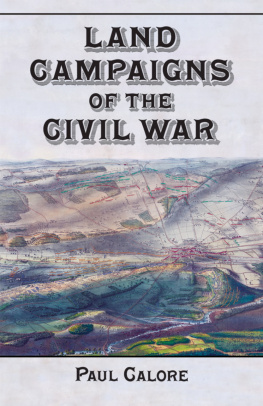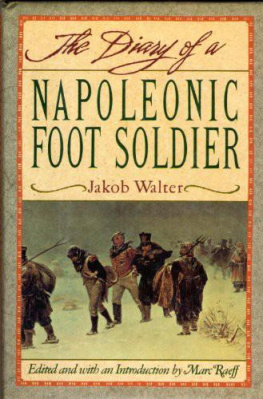
T HE N APOLEONIC L IBRARY
Other books in the series include:
1815: THE RETURN OF NAPOLEON
Paul Britten Austin
ON THE FIELDS OF GLORY
The Battlefields of the 1815 Campaign
Andrew Uffindell and Michael Corum
LIFE IN NAPOLEONS ARMY
The Memoirs of Captain Elzar Blaze
Introduction by Philip Haythornthwaite
THE MEMOIRS OF BARON VON MFFLING
A Prussian Officer in the Napoleonic Wars
Baron von Mffling
WATERLOO LECTURES
A Study of the Campaign of 1815
Colonel Charles Chesney
WATERLOO LETTERS
A Collection of Accounts From Survivors
of the Campaign of 1815
Edited by Major-General H. T. Siborne
www.frontline-books.com/napoleoniclibrary
A S OLDIER FOR N APOLEON
T HE C AMPAIGNS O F L IEUTENANT F RANZ J OSEPH H AUSMANN 7 TH B AVARIAN I NFANTRY

Edited by
John H. Gill
Translated by
Cynthia Joy Hausmann
Frontline Books
Dedicated to all those who still practice the ancient and honourable art o f writing letters.
We are especially grateful to Herr Dr Ernst Aichner and the staff of the Bavarian Army Museum in Ingolstadt for supplying invaluable material on the 7th Infantry Regiment and the Bavarian combat experience during the Napoleonic epoch. We would also like to thank Herr Dr A. Fuchs of the Bavarian Kriegsarchiv for his kind and swift assistance in providing a copy of Franzs Personalakt (OP 78406) and a wealth of other useful information.
Mr Peter Harrington also earned our gratitude for his always-friendly assistance in locating illustrations in the wonderful Anne S.K. Brown Military Collection at Brown University, Rhode Island, USA.
A Soldier for Napoleon
A Greenhill Book
First published in 1998 by Greenhill Books, Lionel Leventhal Limited
www.greenhillbooks.com
This edition published in 2016 by
Frontline Books
an imprint of Pen & Sword Books Ltd,
47 Church Street, Barnsley, S. Yorkshire, S70 2AS
For more information on our books, please visit
or write to us at the above address.
Franz Hausmann Cynthia Joy Hausmann, 1998
All additional text and maps John H. Gill, 1998
ISBN: 978-1-47388-269-0
eISBN: 978-1-47388-271-3
Mobi ISBN: 978-1-47388-270-6
All rights reserved. No part of this publication may be reproduced, stored in or introduced into a retrieval system, or transmitted, in any form, or by any means (electronic, mechanical, photocopying, recording or otherwise) without the prior written permission of the publisher. Any person who does any unauthorized act in relation to this publication may be liable to criminal prosecution and civil claims for damages.
CIP data records for this title are available from the British Library
Maps
1: Paris to Polotsk: The Marches and Campaigns of
Franz Joseph Hausmann
2: The 1805 Campaign Against Austria
Inset: Operations near Iglau
3: Bavarian Actions in 1806-07 and January-October 1813
4: The 1809 Campaign Against Austria
Inset: The Battles of Abensberg and Znaim
5: The 1812 Campaign Against Russia
Inset: Operations near Polotsk
6: The Polotsk Battlefield
7: The Invasion of France 1814
Inset: The Battles of La Rothire and Arcis-sur-Aube
Illustrations
(between )
1: Franz Hausmann as a first lieutenant
2: Johann Wilhelm Hausmann, Franzs father
3: Theresia Hausmann, Franzs mother
4: Bavarian infantry, 1806-14
5: First lieutenant, 7th Bavarian Line Infantry, 1805
6: King Maximilian I Joseph of Bavaria
7: Bavarian infantry on the march, 1813-14
8: Field Marshal von Wrede
9: General von Deroy
10: Marshal St Cyr
11: French troops in Russia
12: Franzs letter of 9 July 1812
13: Marshal Oudinot
14: General Wittgenstein
15: Franzs appointment to the Legion of Honour
16: Bavarian troops attacking at Polotsk
17: The fortress of Thom
18: The Battle of Bar-sur-Aube
19: The Battle of La Rothire
20: Franz after his retirement from the army
21: Antonia Adolay, Franzs second wife
Preface
Franz Joseph Hausmann lived during one of the most important phases of Bavarian history and personally experienced many of the dramatic events that transformed that realm in the first fifteen years of the nineteenth century. Born in 1789, the year of the French Revolution, Franz first entered the army in 1799, the same year that Prince-Elector Maximilian IV Joseph assumed the Wittelsbach throne. Franz left active service in 1815 after the Battle of Waterloo, and finally departed the army in 1818 when the last Allied occupation troops came home from France. Through these years in uniform, he fought in every major Central European campaign of the French Empire: in 1805 against Austria and Russia, in 1806-07 against Prussia and Russia, in 1809 against Austria, in 1812 against Russia, and in 1813 against the combined Allied powers. Finally, in 1814, after Bavaria had changed sides and joined the Grand Alliance against Napoleon, he participated in the invasion of France with the Bavarian Corps of the Allied Main Army. Altogether this comprises a remarkable collection of military experiences for a young man of 25.
Through all the many trials and glories of these years, Franz maintained a detailed march journal and, from 1812, kept up a regular and lively correspondence with his parents, who were then living in Neuburg on the Danube. It is these often lengthy letters which form the foundation of this book. Though we know that some of the letters of 1812-14 have not survived because there are gaps in the sequence of numbers that Franz gave them, those that have remained provide unique insights into military life during the Napoleonic epoch, and we are pleased to offer them to the public for the first time.
The letters are supplemented by what Franzs family calls his military diaries. Though some entries are nothing more than daily march destinations and distances, others provide rare first-hand glimpses into little-known corners of the period: the Bavarian combat experience in the Austerlitz campaign in 1805, for example, or the siege of Thorn (Torun) in 1813. To take advantage of these military diaries and to place the letters in context, we have structured this volume to include chapters on all of Franzs campaigns from 1805 to 1814. Each section begins with an historical overview and commentary on the Bavarian participation in the campaign; this is followed by the military diaries for that year and, for 1812 through 1814, by the letters themselves.
The letters and diaries, written in a simple, practical style, come from a collection of Franzs papers held by his great-granddaughter, Cynthia Joy Hausmann. The diaries had been a part of Franzs life from his earliest years. After leaving Aachen with his parents when his regiment (the 4th Grenadiers) was being relocated to Bavaria, the boy-cadet Franz, not quite ten years old, began in January 1799 to record his daily marches, probably with his fathers help, from just before Essen all the way to Munich and later to Neuburg on the Danube. While on campaign from 1805 through 1814, Franz evidently kept rough notes from which he transcribed the diaries at some subsequent date. As Cynthia has discovered, it is clear in some places that several pages were written at one sitting, and one passage, the entry of 16 May 1809, contains a comment that was obviously added later, The fate that befell the town of Schwaz and several villages can be seen today in the ruins that are still standing there.
Next page















